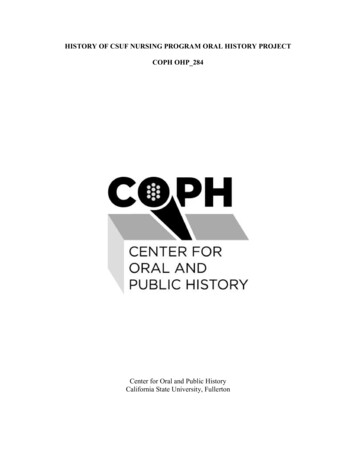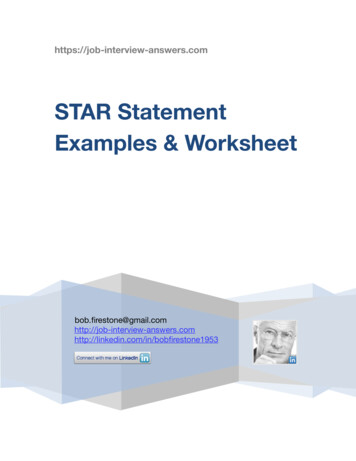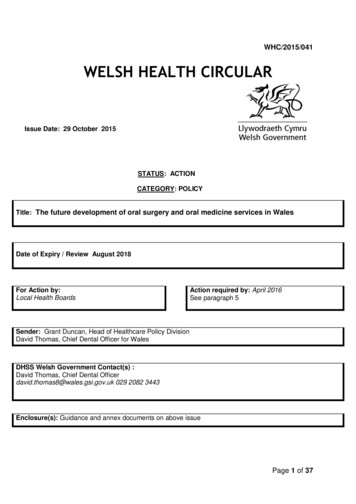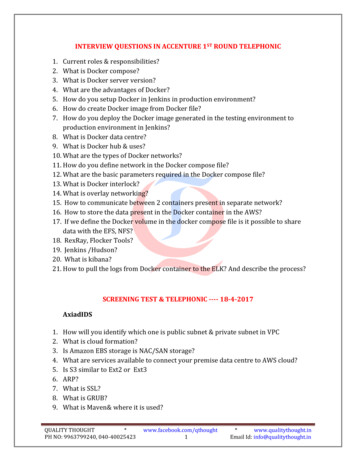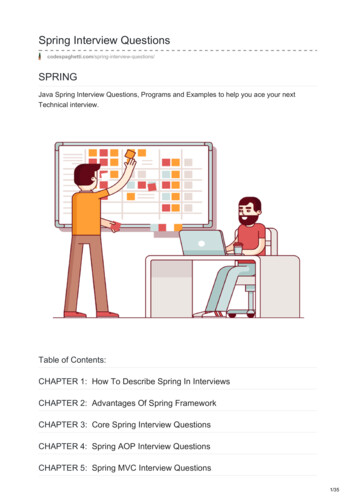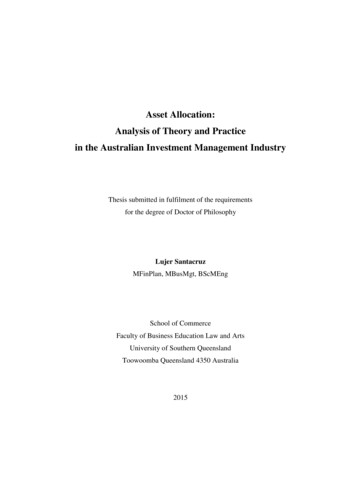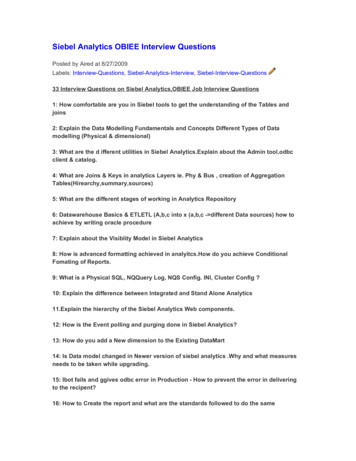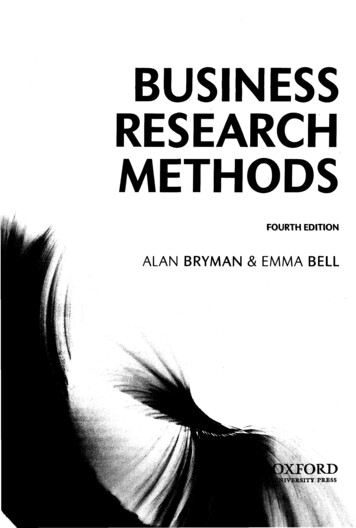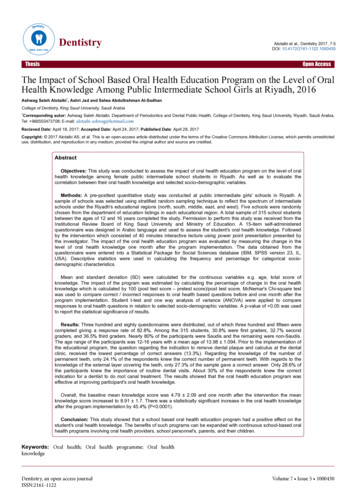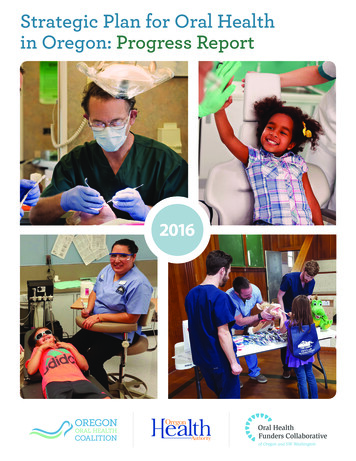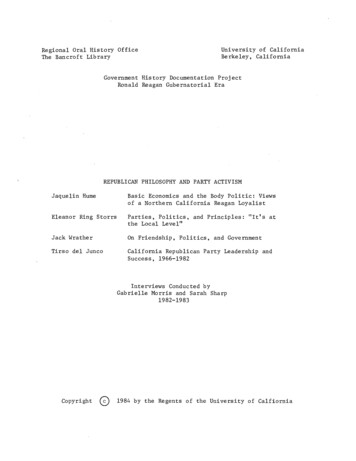
Transcription
California state Archivesstate Government Oral History ProgramOral History InterviewwithWILLIAM B. ROSSPolitical Consultant, 1948 - 1980April 24, May 2 and 9, 1990Los Angeles, CaliforniaBy Enid Hart DouglassClaremont Graduate School
RESTRICTIONS ON THIS INTERVIEWNoneLITERARY RIGHTS AND QUOTATIONThis manuscript is hereby made availablepurposes only. No part of the manuscript maypUblication without the written permission ofState Archivist or the Director, Oral HistoryClaremont Graduate School.for researchbe quoted forthe CaliforniaProgram,Requests for permission to quote for pUblication shouldbe addressed to:California State Archives1020 0 Street, Room 130Sacramento, CA 95814orDirector, Oral History ProgramHarper Hall 155Claremont Graduate School150 E. Tenth StreetClaremont, CA 91711-6160The request should include identification of thespecific passages and identification of the user.It is recommended that this oral history be cited asfollows:William B. Ross, Oral History Interview, Conducted1990, by Enid H. Douglass, Oral History Program,Claremont Graduate School, for the California StateArchives State Government Oral History Program.
March Fong EuSecretary of StateCalifornia State Archives10200 Street, Room 130Sacramento, CA95814InformationDocument RestorationExhibit HallLegislative Bill Service(prior years)(916) 445-4293(916) 445-4293(916) 445-0748(916) 445-2832PREFACEOn September 25, 1985, Governor George Deukmejian signedinto law A.B. 2104 (Chapter 965 of the Statutes of 1985).This legislation established, under the administration ofthe California State Archives, a State Government OralHistory Program "to provide through the use of oral historya continuing documentation of state policy development asreflected in California's legislative and executivehistory."The following interview is one of a series of oral historiesundertaken for inclusion in the state program. Theseinterviews offer insights into the actual workings of boththe legislative and executive processes and policymechanisms. They also offer an increased understanding ofthe men and women who create legislation and implement statepolicy.Further, they provide an overview of issuedevelopment in California state government and of how boththe legislative and executive branches of government dealwith issues and problems facing the state.Interviewees are chosen primarily on the basis of theircontributions to and influence on the policy process of thestate of California. They include members of thelegislative and executive branches of the state governmentas well as legislative staff, advocates, members of themedia, and other people who played significant roles inspecific issue areas of major and continuing importance toCalifornia.By authorizing the California State Archives to workcooperatively with oral history units at California collegesand universities to conduct interviews, this program isstructured to take advantage of the resources and expertisein oral history available through California's severalinstitutionally based programs.
Participating as cooperating institutions in the stateGovernment Oral History Program are:Oral History ProgramHistory DepartmentCalifornia state University, FullertonOral History ProgramCenter for California StudiesCalifornia State University, SacramentoOral History ProgramClaremont Graduate SchoolRegional Oral History OfficeThe Bancroft LibraryUniversity of California, BerkeleyOral History ProgramUniversity of California, Los AngelesThe establishment of the California State Archives StateGovernment Oral History Program marks one of the mostsignificant commitments made by any state toward thepreservation and documentation of its governmental history.It supplements the often fragmentary historical writtenrecord by adding an organized primary source, enriching thehistorical information available on given topics andallowing for more thorough historical analysis. As such,the program, through the preservation and pUblication ofinterviews such as the one which follows, will be of lastingvalue to current and future generations of scholars,citizens, and leaders.John F. BurnsState ArchivistJUly 27, 1988This interview is printed on acid-free paper.
WILLIAM B. ROSS1955
TABLE OF CONTENTSINTERVIEW HISTORY . . .BIOGRAPHICAL SUMMARYiiiiSESSION 1, April 24, 1990[Tape 1, Side A]1Family moves to California--Attends Glendale HighSchool--Wants to become a journalist--Enrolls atUSC--Sells newspaper advertising--Starts W. B.Ross & Associates, a public relations firm--Firstinvolvement in politics is a board of educationcampaign--Meets Herb Baus--Establishes Baus andRoss Campaigns--Early pUblic housing campaigns-Division of labor within Baus and Ross Campaigns.[Tape 1, Side B]38Early competition for clients--Expansion andcontraction of staff for campaigns--Use of pollingas a campaign tool--campaigns for tax exemptionfor nonprofit schools--Strategy for ballotpropositions--Bond issues for municipal utilities.SESSION 2, May 2, 1990[Tape 2, Side A]74Sam Yorty's 1950 congressional campaign-Organizing neigborhood campaign committees-Yorty's assistant, Eleanor Chambers--First NorrisPoulson campaign--Early efforts to build the LosAngeles Music Center.[Tape 2, Side B]opposition to the Los Angeles Music Center--SecondPoulson campaign--Poulson's loses bid for thirdterm--Manages Yorty's reelection campaign formayor--Tom Bradley's losing campaign for mayor.106
[Tape 3, Side A]136Manages L.A. school board campaigns--School bondmeasures--Eugene Debs wins supervisorial seat-Consults on Cox's Pomona mayoralty campaign-Watson runs for county assessor.[Tape 3, Side B]168Strategy for a candidate campaign--Preference forissues campaigns rather than candidate campaigns-Eisenhower for president in 1952--Nixon forpresident in 1962.[Tape 4, Side A]202Goldwater presidential primary in 1964--HandlesChristopher in Republican primary versus Reagan-Brown political operatives sabotage Christophercampaign--Baus and Ross Campaigns works for PatBrown.SESSION 3, May 9, 1990[Tape 4, Side B]223Chief competitors for political consulting-Cranston-Kirkwood campaign for state controller-Importance of southern California population incampaigns--Powerful influence of Los Angeles Timesin campaigns--Manages Manchester Boddy primarycampaign for u.S. Senate--George Christopher forlieutenant governor campaign in 1962--Christopherfeuds with Baus over campaign expenditures.[Tape 5, Side A]254civil suit brought against Baus and RossCampaigns--Baus and Ross rebound by winning bondcampaigns for police department--Manages EvelleYounger's campaign for attorney general--Crossfiling propositions in the fifties--Opposes McLainpropositions for the aged and needy--Bonds toimprove Los Angeles International Airport--Cityreferendum to send the Dodgers back to Brooklyn.[Tape 5, Side B]Telethon promoting the Los Angeles Dodgers--Senatereapportionment Proposition 15--Works againstproposition for cable TV--Extension of daylight286
saving time to October--Opposes state lotteryproposition in the sixties.INDEX OF NAMES307
INTERVIEW HISTORYInterviewer/EditorEnid Hart DouglassDirector, Oral History Program and Lecturer inHistoryClaremont Graduate SchoolB.A., Pomona College [Government]M.A., Claremont Graduate School [Government]Interview Time and PlaceApril 24, 1990Mr. Ross' office, Los Angeles, CaliforniaMorning Session of 1 1/2 hoursMay 2, 1990Mr. Ross' office, Los Angeles, CaliforniaMorning and Afternoon Sessions of 3 1/2 hoursMay 9, 1990Mr. Ross' office, Los Angeles, CaliforniaMorning Session of 2 hoursEditingThe interviewer/editor checked the verbatim manuscriptof the interviews against the original tape recordingsand verified proper names.Insertions by the editorare bracketed.On May 23, 1990, the edited transcript was forwarded toWilliam B. Ross, who made only minor emendations andadded some additional information in writing. Hereturned the approved manuscript June 1, 1990.The interviewer/editor prepared the introductorymaterials.PapersThe papers of William B. Ross will be deposited in theCalifornia State Archives.i
Tapes and Interview RecordsThe original tape recordings of the interview are inthe Oral History Program Office, Claremont GraduateSchool, along with the records relating to theinterview. Master tapes are deposited in theCalifornia State Archives.ii
BIOGRAPHICAL SUMMARYWilliam B. Ross was born on January 29, 1915 inSpokane, Washington. When he was thirteen the family movedto California on account of the poor health of his brother.His father, William G. Ross, was in the banking business andbecame city treasurer for Bell. His mother, Royala LoomisRoss, was a homemaker. William Ross attended Glendale HighSchool and graduated in 1932.Mr. Ross enrolled in University of Southern Californiain the fall of 1932 and majored in journalism. He supportedhimself during his college years by working on severalnewspapers, including the Daily Trojan, the Huntington ParkAdvertiser, and the Los Angeles Times. He also soldnewspaper advertising.In 1936, he married Virginia K.smith, and they had a family of nine children.After graduating from college in 1937, he establishedhis own public relations firm, W. B. Ross & Associates, inLos Angeles. Mr. Ross became involved in politics when hemanaged a 1946 school board campaign for three candidatesrunning for the Los Angeles board of education. Shortlythereafter he met Herbert M. Baus, who had just started hisown political consulting business.In 1948, Mr. Ross and Herbert Baus established Baus andRoss Campaigns. Baus and Ross Campaigns, later to be knownas Baus and Ross Company, was one of the first politicalconsulting firms in California and pioneered the use ofpolling, direct-mailings, and widespread media coverage inpolitical campaigns. The firm worked on various local andstate issues, including pUblic housing, expansion of the LosAngeles International Airport, and tax exemptions fornonprofit institutions.Baus and Ross also handledcampaigns for elective offices at the local level, such asthe Los Angeles City council and mayor races and Los AngelesCounty races for sheriff and assessor, and statewidecampaigns for attorney general, lieutenant governor andgovernor. The firm managed presidential primaries inCalifornia for Richard Nixon and Barry Goldwater.Baus andRoss also directed the Nixon-Lodge general election campaignof 1960 in California.After Herbert Baus left the company in 1969, Mr. Rossremained in the business of political consulting until 1980.In those years he managed several local campaigns and thesuccessful election of Evelle Younger as state attorneygeneral.iii
William Ross has been active in the community. He hasserved as President of the Los Angeles Catholic Press Club,vice president of Holy Family Adoption Foundation, and as aboard member of several charitable and businessorganizations. He is now retired and lives in Los Angeles.iv
[Session 1, April 24, 1990][Begin Tape 1, Side A]DOUGLASS:Mr. Ross, I noted you were born in Spokane in1915.Why were your parents living in Spokane,Washington?ROSS:My dad was a former city treasurer and a bankerthere.He was sent there originally by Dunn &Bradstreet.He came from Portland, Oregon.did my mother.Bradstreet.SoHe went to work for Dunn &They sent him to Spokane, and thenhe got into the banking business.Then hebecame city treasurer, and then he went backinto the banking business and became presidentof a bank up there.We reached a crisis in the family, thehealth of my brother, and came to California.At that time I was thirteen.in California.I turned fourteenSo I have been here ever since,since 1928.1
2DOUGLASS:You were getting away from what kind of weather?Spokane is dry, isn't it?ROSS:No.It is not dry.elevation.Spokane is about 4,000 feetIt gets a lot of rain in thespringtime and a lot of snow in the wintertime.DOUGLASS:A hard climate.ROSS:Temperature gets up in the nineties in thesummertime.It is a kind of dry climate at thattime of the year.It is an area of pine trees,rivers and streams and lakes all around.DOUGLASS:Was your father educated in Washington?ROSS:No.DOUGLASS:How about you?In Portland.You went to elementary school inSpokane?ROSS:Yes.I went to elementary school in Spokane.just started at Lewis and Clark High School.IInmy first semester we cut it off and left inNovember 1928 for California.at Pismo Beach.We hit the coastIt was in December and bright,bright beautiful weather.We had come down inrain and snow all the way, came down centralCalifornia and then over to the coast.mother loved the place.wanted to do.MyDad didn't know what heHe had an opportunity in SanFrancisco, he felt.He had two or three
3interviews possibly in Los Angeles.kind of a halfway point.So it wasWe stopped, and Ientered Arroyo Grande High School.DOUGLASS:Oh, you stopped and rented a house or something?ROSS:Yes.I was in Arroyo Grande High School for theremainder of the year.Glendale.Then we came toI spent three years at Glendale High[School] and graduated from there.DOUGLASS:I'll bet there were people clamming out at PismoBeach when you drove up.ROSS:Gee whiz.In those days clams were everywhere.They had the signs out everywhere, "Clams forsale."use.They had pitchforks for everybody toThey were relatively inexpensive.Everylow tide you would see clams there, they weretoo small, that had been washed up by the surf.It's all different now.DOUGLASS:What brought your father to Glendale?ROSS:He took a job with California Bank, which becameunited California Bank, which became FirstInterstate [Bank].He was the assistant managerof the Hollywood office.It was interesting.At that time Hollywood was Hollywood.His fortewas mostly with motion picture actors andactresses.And Aimee Semple McPherson.
4DOUGLASS:Oh, my.ROSS:It is.up.That is a story in itself.It was a very interesting time to growThen he went out to the town of Bell toclose an office out there.it. He did so well withThey were just going to run out theirlease and quit.depression.It was the height of theThey took over a failed bank.Thatis, they took over the building; the bank hadfolded.He managed in that office up until thetime he went into business for himself.DOUGLASS:Your home was in Glendale?ROSS:The home was in Glendale.from Glendale.Yes.I graduatedHe and my mother moved a yearbefore I graduated.I just stayed in Glendaleto finish school; I was tired of moving.[Laughter]I was doing well in school.DOUGLASS:That was a good high school.ROSS:It was a great high school.Just a wonderfuleducation there.DOUGLASS:So you stayed with another family?ROSS:I stayed in a boarding house.DOUGLASS:And where did they move to?ROSS:They moved to Bell.DOUGLASS:I see.To be near where he would be [working].
5ROSS:Where he was working.He also became citytreasurer of Bell.DOUGLASS:He liked that, didn't he?ROSS:He did.It was a great pUblic relations thingfor the bank and for him.DOUGLASS:In those days, and still, some city treasurersare elected and some are appointed.ROSS:He was elected.DOUGLASS:So he had run for election up in Spokane?ROSS:Up there he was appointed.I got to cast myfirst ballot for my dad for city treasurer.[Laughter]It came out that way.I turnedtwenty-one in January, and he was up forelection in April.year after year.He was reelected year afterHe finally retired.He wantedto stay there until he paid off all the citydebt.And he did.DOUGLASS:Coming out of the depression.ROSS:Coming out of the depression.Yes.At the endof the fifties he quit.DOUGLASS:He was addicted, wasn't he?ROSS:He loved the work, and he loved the people.DOUGLASS:Do you think that got you intrigued with thepolitical world a little bit?
6ROSS:I am sure it did.As a kid, I went aroundpassing out handbills in Spokane.As a kid, heand I used to get up in the morning--my motherwould stay in bed--he would prepare breakfast,and we would read the paper and talk politics.I was kind of excited about it all my life.DOUGLASS:That is most interesting.You decided to go toUSC [University of Southern California].ROSS:Yes.I stayed out a year.the depression.You can do this inI became the editor of theBell-Maywood Industrial Post.[Laughter]It isa newspaper still in existence, I believe.DOUGLASS:I noticed in '32 that you began doing this kindof work.This was the Bell paper.How did thathappen?ROSS:My dad knew the editor.That couldn't hurt.Ihad made up my mind that I wanted to be anewspaper man.Glendale.That is one reason I stayed atI ran across a wonderful man by thename of D. J. Edmondson.He was the journalisminstructor at Glendale High School.loved to write.learned to type.I alwaysI was a pretty good writer.IMy first summer in Glendale Iwent to Glendale Business College and learned totype and do some fast calculations.I ran
7across Edmondson, and I said, "This was for me!"I became editor of the school newspaper.became editor of the yearbook.Then II knew I wantedto get into journalism.At that time, USC was the only school thathad a journalism department.The University ofWashington had a little bit.The University ofWisconsin had a pretty good school.DOUGLASS:Did Stanford [University] have journalism then?ROSS:Not then.time.USc was all alone at that particularJournalism was taught at UCLA [Universityof California, Los Angeles] and at Stanford as apart of the English department but not a degreein journalism.A.B.That is where I went and got my[bachelor of arts] degree.I worked as aneditor of a community newspaper all through thattime I was in school until the last year, and Ibecame a correspondent for the [Los Angeles]L.A. Times.DOUGLASS:I went into that.Did you cover some particular facet of the newsas a Times correspondent?ROSS:Yes.Just USC news.I was down there every daywith stories and pictures.DOUGLASS:So it would be everything from sports topolitics on campus?
8ROSS:Not too much sports because their sports writerscovered that, but everything else was wide openfor me.The social business.We had all kindsof academic things we could talk about and writeabout.DOUGLASS:You were paid by the inch?ROSS:By the inch.DOUGLASS:Do you remember how much?ROSS:No.[Laughter]I don't remember how much.I know that mychecks averaged around seventy dollars a week.That was big money in those days.DOUGLASS:Yes.Very good money.You weren't doing thatat the same time you were editing a communitypaper, were you?ROSS:No.DOUGLASS:You did one or the other.ROSS:I did one or the other.DOUGLASS:Was there another paper than the Bell paper?ROSS:I did the Huntington Park Advertiser, whichYes.later became the Huntington Park Bulletin.Idid that for two years.DOUGLASS:Now you were the editor for these papers.means you coordinated everything.ROSS:I was the editor.the reporter.ThatRewrote.I was the rewrite man.I was the head writer.I wasI was the
9proofreader.[Laughter]In those days it was aone-man operation.DOUGLASS:Were they weeklies?ROSS:Semi-weekly.DOUGLASS:So you had two deadlines a week.ROSS:Yes.DOUGLASS:You were busy.ROSS:Yes.Both of them.I had a rough time making my eight o'clockclass because oftentimes I didn't get out ofthere until two o'clock in the morning.DOUGLASS:Did you get credit for this work towards yourdegree?ROSS:No.It was just the way I was supportingmyself.My parents didn't have that kind ofmoney in those days.year.They paid for my firstMy mother took something she had for thefirst semester and my dad for the secondsemester.The next three years, it was up tome.DOUGLASS:Did you live near the campus?ROSS:No.I lived in Bell.In those days a commutewas about twenty minutes.streets.I went all on surfaceThe main street of Bell falls betweenSlauson [Avenue] and Florence [Avenue].So Iworked on to Slauson and would corne over on the
10side streets.USC was at Exposition [Boulevard]and Figueroa [Street] at that time.At thecorner when the parking lots were there.DOUGLASS:It sounds like you enjoyed college.ROSS:Very much so.I just had a wonderful education.At least the experience was wonderful.into journalism school.I gotI became what theycalled the "day editor" of the Daily Troian.Then I got married at the end of my junior year.DOUGLASS:Was your wife going to USC?ROSS:She was going to USC.of my junior year.important to me.I got married at the endMoney got to be veryI got involved in advertising.To begin with, I was doing advertising as aminor along with a major in journalism.DOUGLASS:Would that be in the school of business?ROSS:I did advertising and marketing.the College of Commerce.of it.That was inI had seen that sideI drifted into the advertising side,selling advertising for the Daily Trojan.quite well on that.I didThen I became businessmanager in the last year there, of the DailyTrojan.DOUGLASS:You had an amazing amount of experience by thetime you left college.
11ROSS:By the time I left college I really had seen thewhole side of the publishing business, thenewspaper pUblishing business.Of course, inthose days, it was very important.have TV [television].We didn'tI started an advertisingagency while I was still in my last year at USC,called the Trojan Advertising, because I wasoperating out of the Daily Trojan office.[Laughter]DOUGLASS:But it was your business.ROSS:It was my business.DOUGLASS:Were there any particular professors or peopleYes.you met at USC that affected your life?ROSS:Yes.Roy [L.] French, who was the head of thedepartment of journalism.Just a wonderful man.He made that whole university program tick.he was very important.SoThat is the one person Iwould think of.DOUGLASS:Was he a supportive person?of ideas?Did he have a lotIn what way did you think he wasoutstanding?ROSS:To begin with, he had a great sense of humor,and was a great lecturer.He also kept hisfinger in all the pUblications, everything thatwas going on.The office door was always open.
12No secretary.door.If he wasn't busy, he opened theHe always had time to talk to you.Hecould talk about anything and everything inconnection with your studies.DOUGLASS:How big were your classes?ROSS:They were wonderful classes.Fifteen, twenty,twenty-five.DOUGLASS:So you really had the personal touch.ROSS:Yes.You get to know everybody in thedepartment and everybody on the staff of thenewspaper.I started writing for it the firstminute I got started there.DOUGLASS:You never regretted that choice.ROSS:I sure didn't.Then I went into advertising andpUblic relations.The accent, to begin with,was mostly on pUblicity because I could bang outnews stories real fast.DOUGLASS:This is when you established W. B. Ross &Associates?ROSS:After I got out of school, I started W. B. Ross.DOUGLASS:After you had the Trojan Advertising.ROSS:Yes.I had mostly pUblicity accounts.Advertising just came along later, really.DOUGLASS:Because, as you say, of this ability to bang outthe stories.
13ROSS:Yes.DOUGLASS:Where did you operate out of when you began thatfirm?ROSS:I operated out of a little office on EstrellaStreet, just off of Washington Boulevard.Atthe tail end of my junior year I started doingpUblicity for Pierce Brothers Mortuaries.Thatis really where you are banging out obituaries.Zing, zing, zing, zing.It was my "foundation"account.DOUGLASS:How did you happen to get that job?ROSS:Through an advertising agency contact.I wasdoing this while at the same time I was going toschool and at the same time I was in thenewspaper business.I was putting out a monthlypUblication for the Central ManufacturingDistrict.DOUGLASS:What kind of a pUblication was that?ROSS:It was more or less a house organ.Two things.I talked about the new companies coming in.Iinterviewed them and got the whole history ofthe company.The other part of it was justgeneral news on business in southern California.DOUGLASS:Was the Central ManUfacturing District anorganization of manufacturers?
14ROSS:No.It actually was a district.streets were private.main one.All theLeonis Boulevard was theIt was to the north of Slauson.Leonis Boulevard was the main entrance to it.It had a lot of very big businesses.Spring & Bumper [Sattler [Co.].] was there.U.S.Gaffers &They were the biggest kitchenrange makers at that particular time here.DOUGLASS:So it was like a big industrial park.ROSS:It was a big industrial park.it a park in those days.They didn't callBut the main advantageof it, I am sure, was that they could lock offthe whole park.If anybody wanted to picket,they had to picket the park gates.couldn't picket one place.TheyThey couldn't go inthere.DOUGLASS:So you put out an in-house news organ.ROSS:It was a magazine.magazine.A six-by-nine [inches]A little bUlletin-type thing.thirty-two to forty-some-odd pages.advertising in it.It hadIt had someNot much.The Central Manufacturing District wasstarted by the Santa Fe Railroad to develop ashipping business for them.They had done itvery successfully in Chicago, and they started
15it here.They had what they called a "neutralshipping service," which was very important toshippers.They would pick up your stuff righton the site at your plant and take it to UnionPacific [Railroad] or Southern Pacific[Railroad] or to their own place and hook you onthere.Santa Fe also, at that time, had thebelt-line railroad from the harbor and had allthe harbor business.Again, it was a neutralshipping service, but they got a lot of businessout of it.DOUGLASS:So that was a monthly?ROSS:It was a monthly.Anyway, through them I wasworking for their advertising agency.Ireported to that person, who couldn't writeanything.But he was a good promoter andsalesman.Somebody had come to him--I don'tknow who--and said, "It appears by this they arelooking for a man."He sent me down to thePhilip Meany Company, which was the advertisingagency for Pierce Brothers.I talked to themand they sent me out, and Pierce Brothers hiredme.DOUGLASS:And was your job to pound out obituaries?ROSS:Pound out obituaries.
16DOUGLASS:For,the newspapers?ROSS:For the newspapers.In cases of importantpeople they waked me up in the middle night.Inthose days, you had morning newspapers that keptan overnight person on the city desk.I wouldcall in and tell them that Tom Mix had died orso-and-so died.days.Movie people were big in thoseThey would catch it then in their firstA.M. edition.DOUGLASS:Were you paid an hourly salary or by the amountpublished?ROSS:I was paid a hundred dollars a month, which wasfantastic to me.DOUGLASS:Was this right after you were out of college?ROSS:No.DOUGLASS:So you were bankrolling quite a bit by the timeI was still in college.you were a senior?ROSS:I was.It was kind of a funny thing.making a little over 400 a month.the manager of the California Bank.making 230 a month.I wasMy dad wasHe wasI used to tell myself, "Ican't afford to graduate," because my senioryear I was business manager of the pUblicationsand on salary and commissions.[Laughter]
17DOUGLASS:Did you ever sleep?It sounds like you werepretty busy?ROSS:I was pretty busy.I didn't sleep too much.Iwas 6'4" and 140 pounds when I graduated.DOUGLASS:You were a slim fellow.Tall and slim.Toestablish your own business, which you did in'37, did that require any capital for you to dothat?Or did you pretty well have yourtypewriter and everything you needed, and rentedan office?ROSS:Yes.I rented an office.DOUGLASS:On Estrella.ROSS:The office was owned by Pierce Brothers.Itwasn't too much of an office.DOUGLASS:Did you have a secretary?ROSS:No.DOUGLASS:Just you.ROSS:Just me, to begin with.I really didn't need asecretary because I was a very good typist.had learned the touch system.I could bang outletters.Down at the bottom I would put"wbr/b"."William B. Ross/Bill."DOUGLASS:So who is to know.ROSS:Yes.I[Laughter]I made them look really good.[Laughter]
18DOUGLASS:So you are now being pulled, as you say, awayfrom straight journalism, which had been sort ofyour love.ROSS:How did you feel about that?I liked it.I don't think I ever was in lovewith it the way I was with the newspaperbusiness.But I got to be good at it.I hadMonarch Finer Foods, which was at that time apretty big account in the food business.I gotthat out of the Central Manufacturing District.DOUGLASS:So you began to get contracts or accounts.ROSS:Yes.You just went from one thing to another.Pretty soon I was hiring a secretary, and I washiring a writer to pound out obituaries.DOUGLASS:So you still had Pierce Brothers.ROSS:Yes.Then I got into the Pierce InsuranceCompany, which is an interesting story.DOUGLASS:Was that an offshoot of Pierce Brothers?ROSS:Yes.I was the guy who was able to give it thename Pierce Insurance.I was doing obituaries,and Mark Pierce used to give me other thingsevery once in a while to do.He began to giveme advertising to do on this insurance company,which was Imperial Mutual Life InsuranceCompany.Mutual is a bad sort of thing.Policyholders get assessed if they go broke.He
19told me that he wanted to go to a privatecompany and change the name to Pierce InsuranceCompany.I think the state insurance commissionwould not allow him to do it.He was very upsetabout that.I said, "Why won't they allow you to doit?"He said, "They say that you can't name itafter somebody who is alive.alive."Because I amHe had two other Pierce family membersin there, all alive.me do it."He said, "They won't letI said, "Why don't you name it afterPresident [Franklin] Pierce.""who was President Pierce?""Well," he asked,[Laughter]I wentto an encyclopedia, brought it to him, andshowed him who the guy was and his picture.dummied up a pOlicy for him.II got a standardframe and pasted in Franklin pierce's pictureand put the dates in.Eighteen-something toeighteen-something, fourteenth president ofunited States.the commission.And that passed.That went byThen he had the PierceInsurance Company.DOUGLASS:Your college education paid off.ROSS:Mark thought so.
20DOUGLASS:Tell me about the Pierce family.Was this thegeneration that established the business?Itwasn't the father?ROSS:It was Mark pierce's father.DOUGLASS:Was his father still alive at that point?ROSS:No.DOUGLASS:Could
Claremont Graduate School. Requests for permission to quote for pUblication should be addressed to: California State Archives 1020 0 Street, Room 130 Sacramento, CA 95814 or Director, Oral History Program Harper Hall 155 Claremont Graduate School 150 E. Tenth Street Claremont, CA 91711-6160 The request should include identification of the
